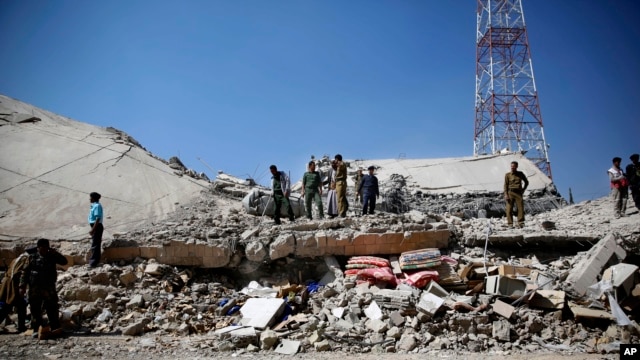UN experts are calling for the Security Council to set up an inquiry into reports of violations by all warring parties in Yemen. More than 5,800 people have been killed since Saudi-led airstrikes began in March.

Policemen gather at the site of a Saudi-led airstrike on the police headquarters in Sana'a, Yemen, Jan. 18, 2016.

Policemen gather at the site of a Saudi-led airstrike on the police headquarters in Sana'a, Yemen, Jan. 18, 2016.
In a report obtained by news agencies but not released publicly, the UN panel described a dire humanitarian crisis compounded by coalition airstrikes on civilian neighborhoods, the "destabilizing accumulation of arms" and a Saudi blockade of ships carrying essential supplies to Yemen.
It said civilians were suffering under tactics that "constitute the prohibited use of starvation as a method of warfare," while the overall chaos was allowing militant groups like the "Islamic State" (IS) to expand.
The report, which was presented to the Security Council last week, called for a new international inquiry into widespread reports that the Saudi-led coalition has targeted civilians "in a widespread and systematic manner."
But their demands led to immediate skepticism after a previous bid by the UN Human Rights Council to set up an inquiry was called off after objections from Saudi Arabia.
The new report stated that the UN team relied on satellite imagery and other sources to corroborate reports, as it is currently too dangerous to visit Yemen.
The panel documented 119 coalition sorties "relating to violations of international humanitarian law," with many involving multiple strikes on civilians.
Among the targets were refugee camps, weddings, buses, residential areas, medical facilities, schools, mosques, markets, factories, food warehouses and airports, the report said.
The UN experts "also documented three alleged cases of civilians fleeing residential bombings and being chased and shot at by helicopters."
Harsh criticism
The report claimed that missiles, originating from Iran and bound for Houthi rebels, had been seized off the coast of Oman.
The conflict in Yemen worsened after the Houthis and their supporters, who are allied with former president Ali Abdullah Saleh, captured large swathes of the country, including the capital, Sanaa. That brought about a regional response led by Yemen's closest neighbor, Saudi Arabia, in support of internationally recognized President Abed Rabbo Mansour Hadi.
The paper also accused the regional coalition of supplying weapons to various armed groups without ensuring proper accountability and secure storage.
The report comes amid increasingly harsh criticism of all warring parties in the Yemen conflict by the UN in recent days.
Earlier this month, the UN's human rights representative in Yemen was briefly expelled after the world body claimed that coalition forces had used cluster bombs.
Over 80 percent of Yemen's population is in dire need of food, water and other aid, according to aid agencies, and the report said that warring sides have failed to fully observe a single humanitarian pause to help alleviate the populace's suffering.






0 Comments